
What is Fish Oil? (Why Should You Be Taking It?)
Jul 15th, 2021
Fish oil has come a long way since getting a big spoonful of cod liver oil. These days there are a ton of supplement options on the market. Many of them may seem quite similar. You also may wonder, “What is fish oil good for exactly?” To help you navigate these busy waters, we have put together a guide to the good stuff about fish oil. Let us dive in to why you would take it, how it Is made, what to look for, and lots more!
The Role of Healthy Fats in our Body
Fat is one of 3 macronutrients needed in the human diet. (The other two are protein and carbohydrates.) Our bodies use fat for fuel and energy storage. Fat is also part of our cell membrane structure. Of course, some types of fat are better than others.
Types of Fats
- Unsaturated fats. These “good” fats have been linked to lower risk of certain diseases. They are found in foods such as salmon, olive oil, nuts, and seeds. These include polyunsaturated fatty acids like Omega-3s and Omega-6s.
- Saturated fats. Saturated fat is in foods like butter, palm oil, lard, shortening, margarine, sausages, hot dogs, regular ground beef, and deep-fried items. USDA MyPlate guidelines recommend limiting saturated fat in your diet. Look for unsaturated replacements!
- Trans fats. It is recommended to avoid this type of fat. According to the School of Public Health at Harvard, trans fats are linked to increased disease risk. Trans fats are found in partially hydrogenated oils.
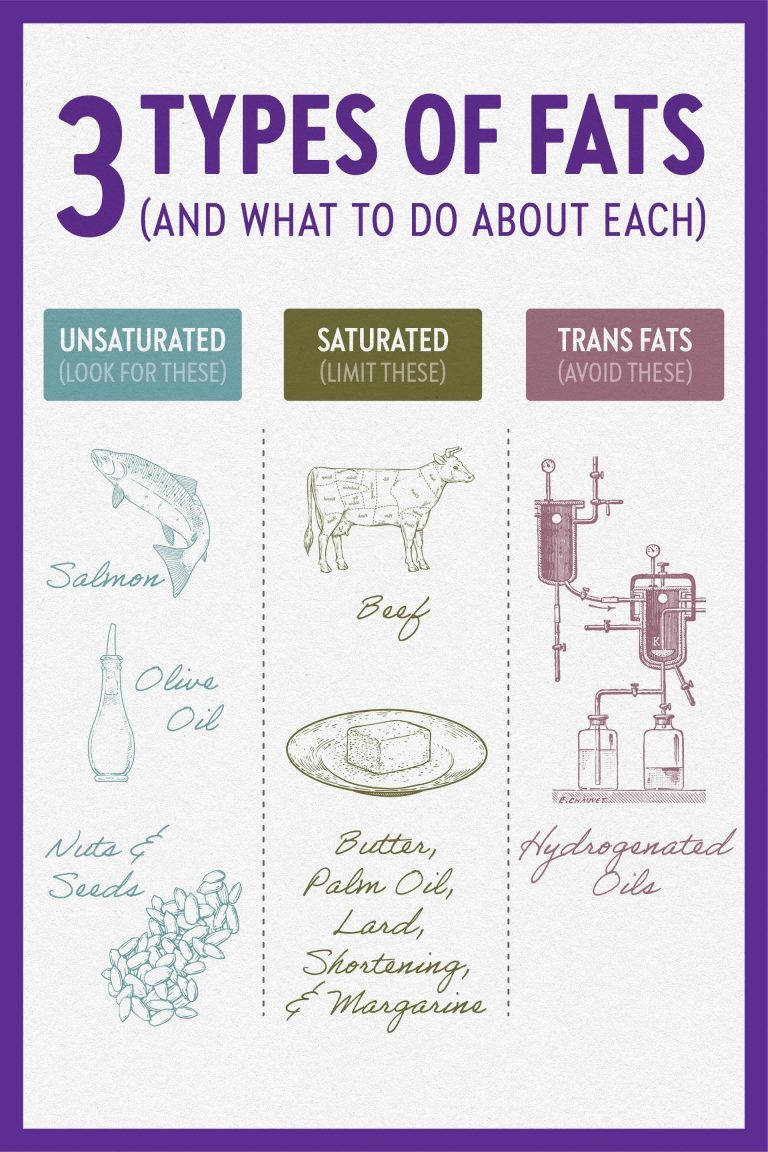
Good Omegas
When it comes to good fats, there is one type that stands above the rest: Omega-3 fatty acids. The body does not make its own Omega-3s, so it is important to get them from food.
Why so key? Research shows that Omega-3s can reduce the chance of heart attack or dying from heart disease. EPA (Eicosapentaenoic acid) and DHA (Docosahexaenoic acid) are Omega-3 forms that the body can recognize and use right away. EPA and DHA are found in seafood and in fish oil supplements. ALA (alpha-linolenic acid) is a plant-derived Omega-3 found in flaxseed oil and canola oil. However, the body must work to convert that ALA into EPA and DHA before it can be used. That means ALA is not considered as potent.
What is Fish Oil?
Fish oil is the liquid oil extracted from ocean fish that are good sources of EPA and DHA. Fish oil pills are an easy way to get Omega-3 fatty acids, whether you prefer to eat fish or not. Health experts recommend eating at least 2 servings of fish per week. These should preferably be fatty types that will really deliver these cardioprotective Omega 3s.
What Species of Fish Provide Omega-3s?
Obviously, it is best to get fish oil from oily types of fish! Salmon is a fatty, cold-water fish that is a great source of Omega-3s. While other types of fish also provide Omega-3s, New Chapter prefers to use Wild Alaskan Salmon. Wild Salmon does not require heavy, multi-step processing to purify it. It is also a more sustainable choice. Let us compare common fish oil ingredients.
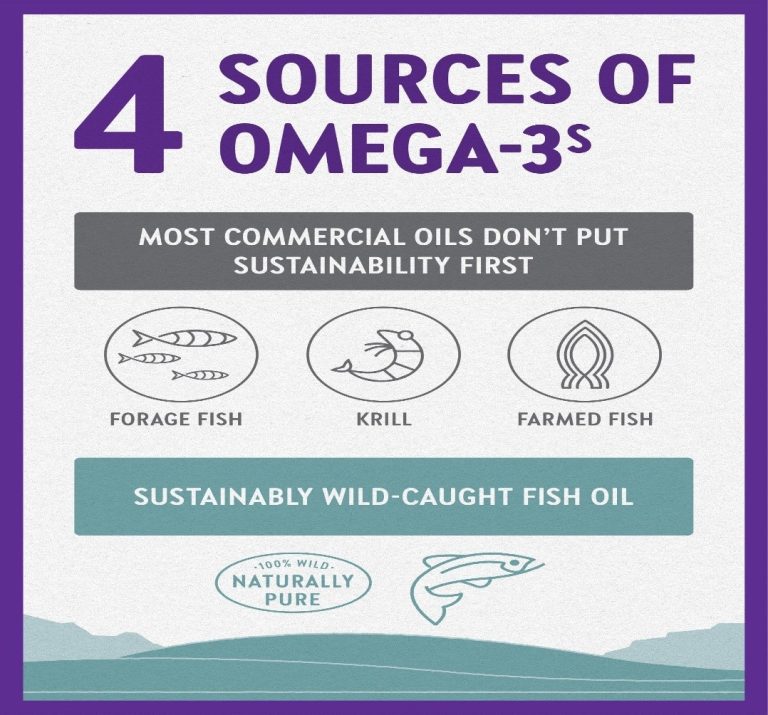
Forage Fish
Many fish oil supplements are made from forage fish such as anchovies, sardines, and menhaden. These small species make up an essential part of the marine food web. Unfortunately, forage fish tend to be overharvested.
Forage fish are adequate sources of Omegas when consumed fresh. However, oils from these types of fish are often sourced from various locations around the world, with fish that have been shipped long distances. The fish oils typically go through a high-heat sterilization and bleaching process before use in supplements. This multi-step process fractionates, isolates, and distills the oil. It can remove some of the beneficial compounds naturally found in the whole fish.
Krill (Not a Fish)
Krill is another source for Omega-3 supplements. It is actually not a fish, but a small crustacean (like a shrimp). Commercial krill harvests around Antarctica are technically limited, but krill are a vital food for many larger marine animals including blue whales and penguins. Even “small” harvests can impact these larger species.
Farmed Fish
One might think that farming salmon and other types of fish gives their wild relatives a break. However, farmed fish are often fed forage fish. This adds to ocean species depletion. Plus, intensive fish-farming operations can lead to water pollution, disease infestations, and destruction of coastal habitats from fish waste. There is also now a type of farmed salmon that is genetically modified. Researchers don’t yet know the long-term impact of cultivating and consuming genetically modified organisms (GMOs).
Wild Alaskan Salmon
By contrast, a Wild Alaskan Salmon oil like New Chapter’s Wholemega™ comes from a sustainable source and is naturally pure. Like extra-virgin olive oil, the fresh salmon is pressed immediately after harvest. Our gentle, food-grade process is all that is needed to deliver Wild Alaskan Salmon’s 17 Omega fatty acids—from Omega-3s to Omega-9s. Wholemega fish oil keeps the beneficial compounds from Salmon, which include healthy Vitamin D3. The result? A whole-food alternative to heavily sterilized or less than sustainable fish oils. The healthy Omegas in the fresh-pressed fish oil are better absorbed by the body.
How Much Fish Oil Should I Take?
The American Heart Association recommends eating at least 2 servings of fish per week to get your all-important Omega-3 fatty acids. The current Dietary Guidelines for Americans agree, recommending that adults have 8-10 ounces of seafood per week, with salmon being particularly recommended for its high EPA and DHA and low incidence of mercury. A serving size of fish is 4 ounces. (According to the Mayo Clinic, that’s about the size of a deck of cards.)
That said, most Americans do not eat that much fish. Some do not eat fish at all. So, taking a whole-food fish oil like Wholemega can be super helpful. When you take Wholemega every day for a week (2-gram daily serving), you consume the whole Omegas of 3 weekly servings of Wild Alaskan Salmon, a highly recommended fish. That is right on target.

When to Take Fish Oil Supplements
You may be thinking, “Sounds great, but when should I take fish oil supplements?” Should you take your fish oil during a meal? Does time of day matter? The answer to when to take fish oil is simple: just follow the fish oil dosage directed on the label. New Chapter’s Wholemega is taken with food, so you can add the 2 softgels to your routine with any meal. Take them in the morning, at lunchtime, or in the evening if you prefer. Talk to your healthcare professional if you have questions about what supplements are right for you. For those who prefer a smaller softgel, easy-to-swallow Wholemega Tiny Caps™ deliver the same dose of fish oil in a miniature size (4 tiny softgels daily).
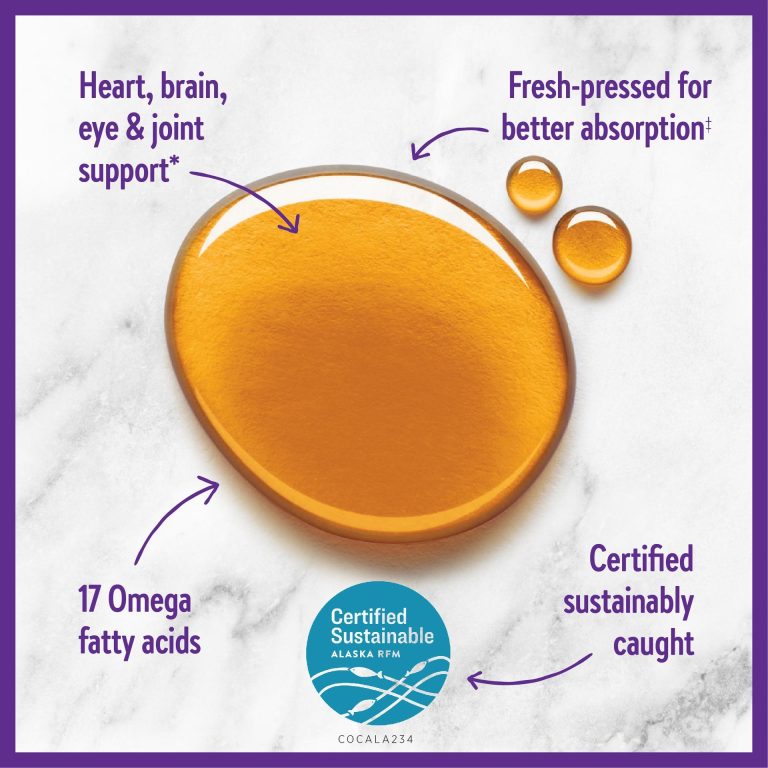
Heart Health Benefits of Fish Oil
Fish oil’s heart health benefits are the main reason people take this supplement. The science is compelling. First, the Omega-3s EPA and DHA may reduce the risk of coronary heart disease. † In addition, Wholemega fish oil has tested effective for multiple heart health benefits.
Improves Omega-3 Index
One serving of Wholemega per day (2-gram daily serving) was clinically studied to improve the Omega-3 Index, a studied heart health marker.* The Omega-3 Index indicates the percentage of beneficial Omega-3 fatty acids among the total fatty acids in the red blood cell membranes.
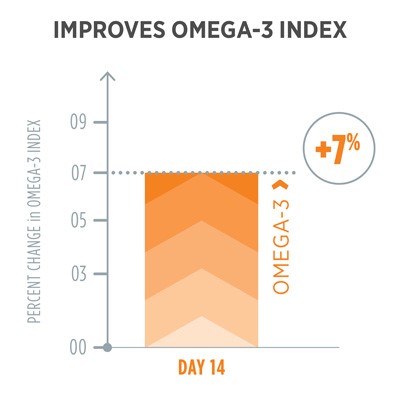
Retains Healthy Triglyceride Levels
In a clinical study, one serving of Wholemega per day (2-gram daily serving) for just two weeks helped retain healthy triglyceride levels.* Triglycerides are a form of stored fat found in the bloodstream and body tissues. Keeping these levels in a healthy range is important for heart health.
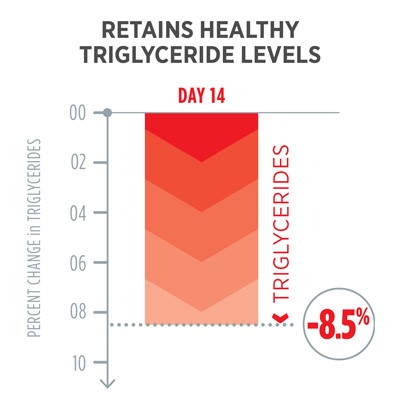
Pair with Zyflamend for More Benefits
For a heart-healthy supplement regimen, research suggests adding our 10-herb Zyflamend™ formula to your daily serving of Wholemega. In a clinical trial of these two products combined, healthy blood vessel function significantly improved, supporting optimal circulation as well as overall cardiovascular benefits.*
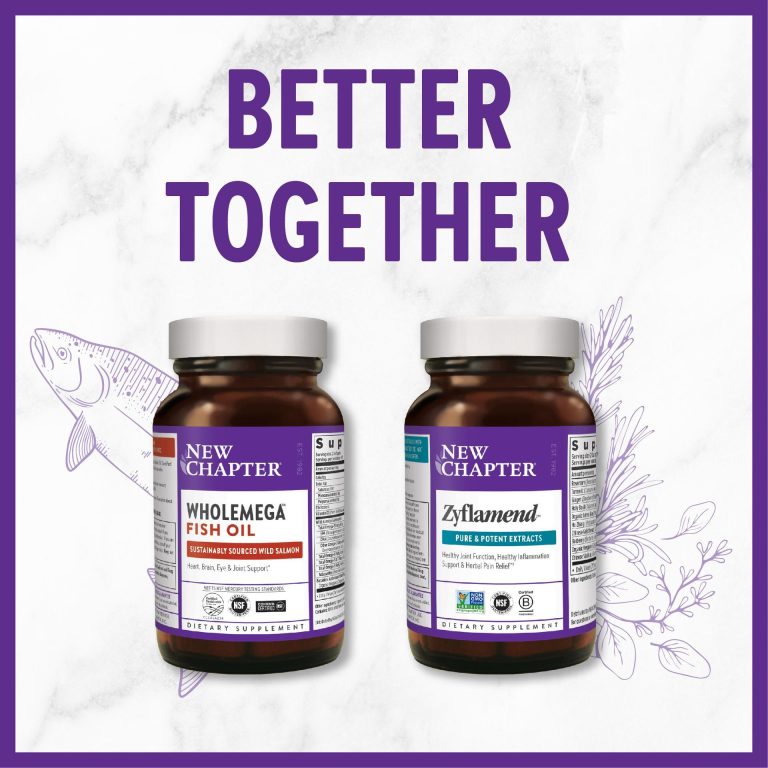
Additional Benefits of Fish Oil Supplements
“Superfood” is a tasty-sounding word that gets tossed around a lot, but what exactly is a superfood? While there is no official definition, think of it as a food from Nature that is packed with nutrients known to have health benefits. Wild Alaskan Salmon qualifies for sure! Not only does it support heart health with Omega-3 fatty acids, but fish oil benefits other areas of health as well.
Brain Support
Fish oil delivers good fats that support healthy brain functions and mood.*
Joint Support
Good fats from fish help maintain healthy cartilage and joint structure.*
Pregnancy Support
Moms can take Omega-3s during pregnancy and breastfeeding to be sure their baby is getting good fats, too. Omega-3s are critical for baby’s visual and cognitive development. Wholemega™ for Moms prenatal fish oil is formulated in easy-to-swallow tiny softgels. It supports mom and baby with 935 mg of highly absorbable‡ good Omegas per serving, including EPA & DHA.
How is Fish Oil Harvested Sustainably?
Overfishing is one of the world’s biggest sustainability problems, so when choosing a fish supplement to take every day, you want to be sure it is doing no harm. Pay attention to how the fish oil is made! New Chapter uses Wild Alaskan Salmon oil because it is 100% sustainably caught to support both people and planet.
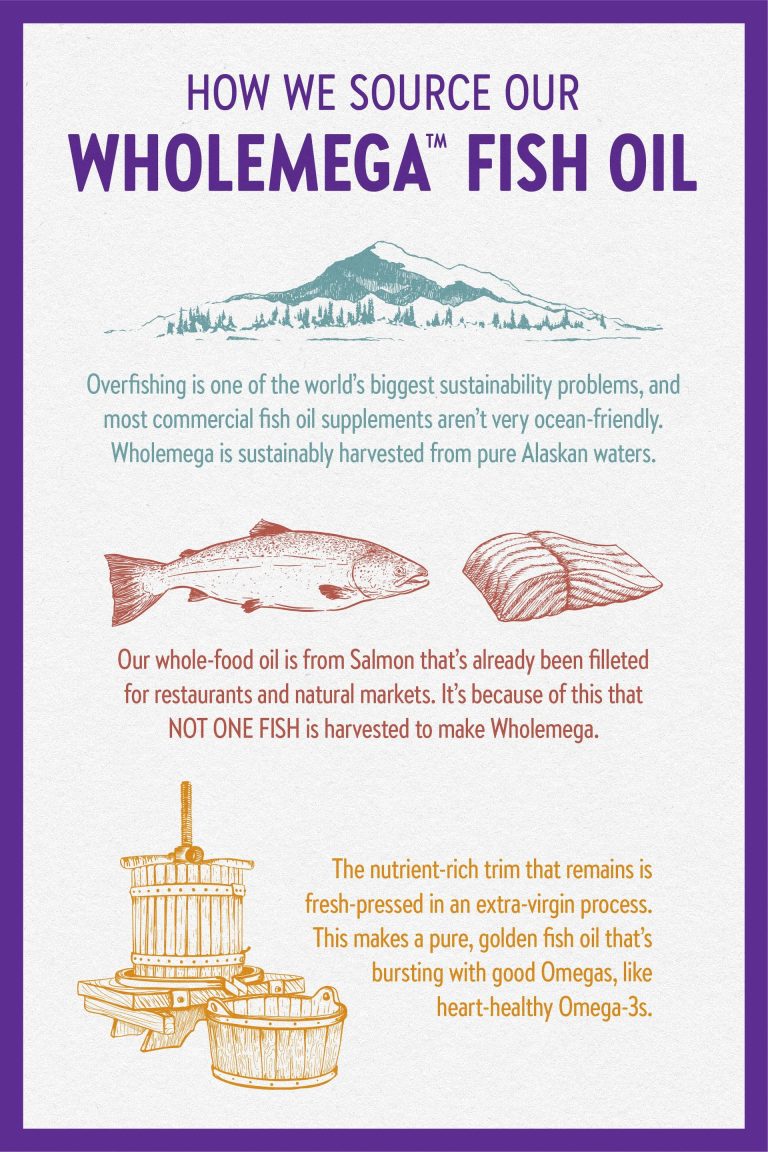
Wholemega is harvested with no bottom trawling, no bycatch, and no wasted catch. How can we be so sure? The truth is, not even one incremental fish is caught to make Wholemega fish oil. We press it from Wild Salmon already caught to be filleted for fine retail stores and restaurants. Our supplier removes the fillets, then presses the nutritious trim that remains instead of discarding it. This yields a naturally pure, golden, whole-food oil, and helps use all the precious salmon.
Where is New Chapter Fish Oil Sourced From?
To ensure that our fish oil is doing no harm to the planet, we choose Salmon sourced only from Certified Responsible Alaska Fisheries. Sustainable salmon fishing is state law in Alaska, ensuring Wild Alaskan Salmon is managed and harvested in an environmentally sensitive and responsible manner. In Alaska, each salmon run is continuously monitored to ensure healthy stocks of returning wild salmon. If the numbers of returning fish do not meet pre-set quotas, the annual catch is suspended. Alaska maintains one of the world’s most well-managed programs. We are proud to only source third-party certified fish oil from Alaska’s pure waters.
Dangers of Some Fish Oils
You may have heard that some types of fish may have higher mercury levels. Fortunately, Salmon is a best choice fish according to the FDA (Food & Drug Administration). It has safe levels of mercury, and it is fine to eat the recommended 2-3 servings a week of Salmon to get those critical Omega-3s. Other fish on the best list include anchovies, sardines, and cod.
In addition, every batch of our Wild Salmon Oil is rigorously tested for your safety. Wholemega salmon oil is certified by NSF and meets or exceeds their strict standards for levels of mercury and other heavy metals.§
Types of fish to limit or avoid, according to the FDA, are king mackerel, marlin, orange roughy, shark, swordfish, and tilefish. This is especially important if you are pregnant or planning to be.
What to Look for in a Fish Oil Supplement
If you are looking for the best fish oil, we think it comes from the best fish! Our Wild Alaskan Salmon oil is sustainably sourced from Alaska, Non-GMO Project Verified, and fresh-pressed in a gentle, whole-food process. Discover the gold standard in fish oil: naturally pure, clinically studied, packed with multiple Omegas including Omega-3s, and a source of naturally sourced Vitamin D3. No farmed or forage fish in sight. Now that’s wellness, well done!
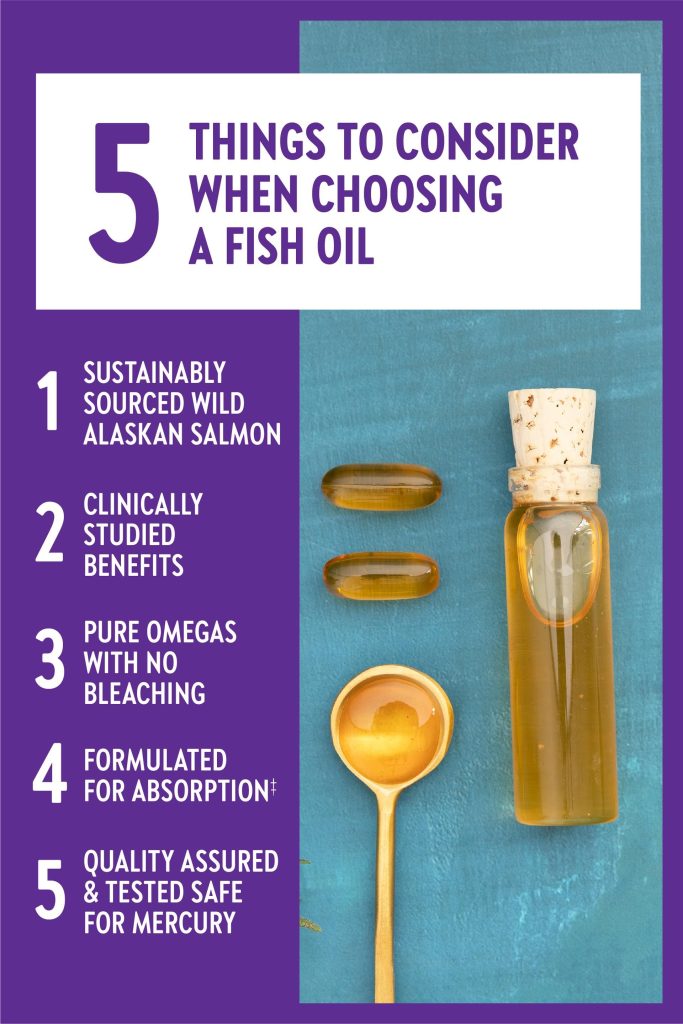
† Supportive but not conclusive research shows that consumption of EPA and DHA omega-3 fatty acids may reduce the risk of coronary heart disease. See nutrition information for total fat, saturated fat, and cholesterol content.
‡ Wholemega is fresh-pressed to deliver healthy Omegas for better absorption.
§Meets or exceeds NSF/ANSI 173 Standard for mercury & other heavy metals as Certified by NSF
*These statements have not been evaluated by the Food and Drug Administration. This product is not intended to diagnose, treat, cure, or prevent any disease.
© Copyright 2021 New Chapter, Inc.

